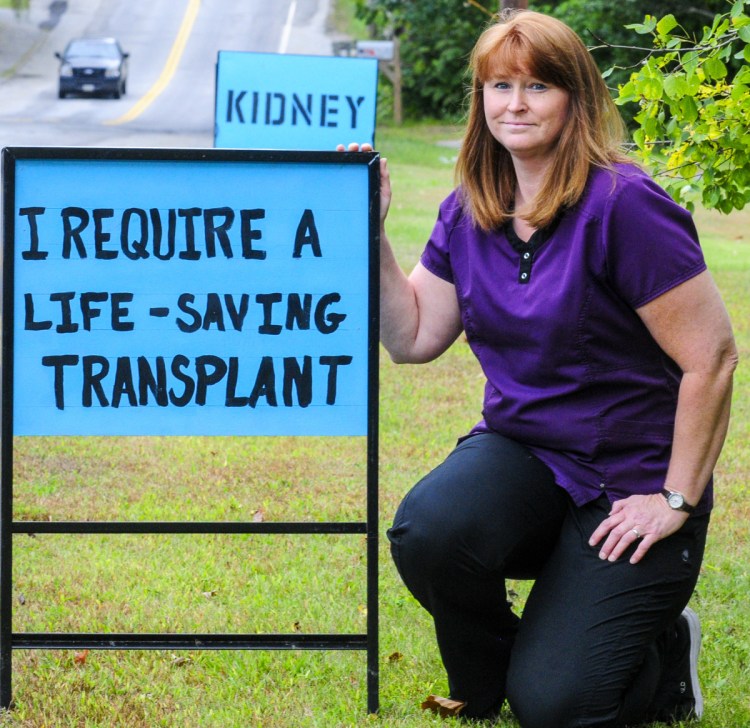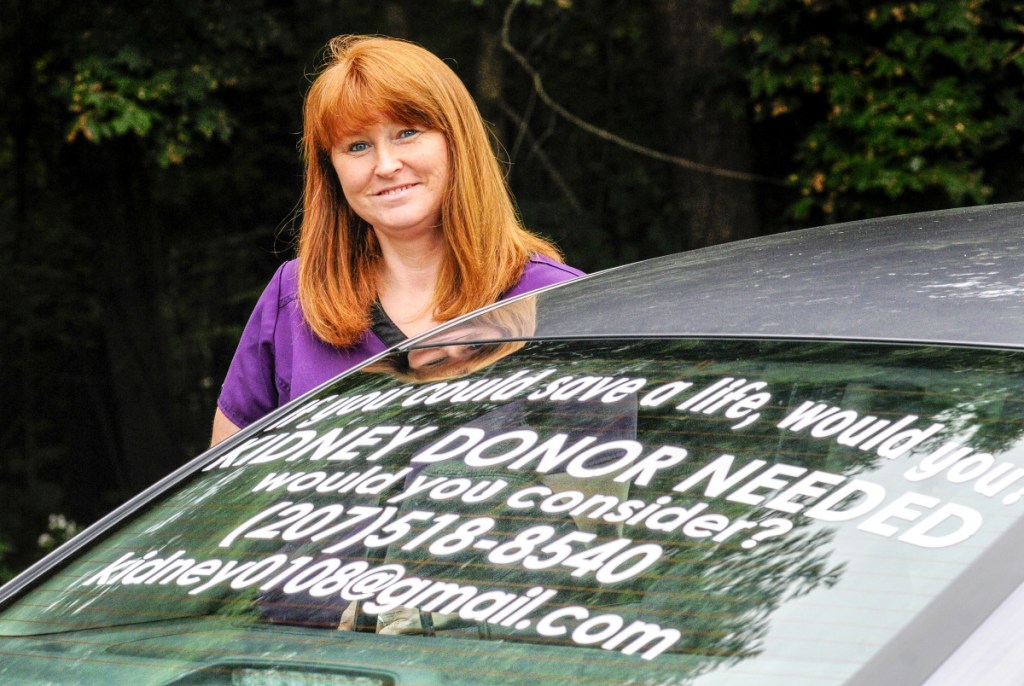AUGUSTA — An Augusta woman who is on a waiting list for a kidney transplant is making a highly visible plea for help, erecting a half-dozen signs this week on her property in what she calls a “last ditch effort” to find a donor.
Krystal Reardon has already received several phone calls, but the wait for a kidney donation can be a lengthy one.
Reardon’s plight mirrors those of others on transplant waiting lists, many of whom wait years for a match or die before one is found.
Reardon, a 44-year-old mother of two adult daughters, has lived in Augusta for 17 years with her husband. She is a visiting nurse with MaineGeneral HomeCare.
Reardon suffered a heart attack last year. During treatment, doctors injected a dye to help identify her blood vessels. The dye, she said, can cause kidney damage, and it revealed and exacerbated kidney problems from a birth defect that had gone unnoticed for years.
“I was doing fine throughout the rest of my life until last year,” she said Thursday. “The dye … caused my kidneys to fail completely.” She had already been suffering from renal insufficiency, a general term for poorly functioning kidneys. Renal insufficiency can cause hypertension, but some who have it show no symptoms.
She has been on dialysis for eight months, requiring eight-hour sessions six days a week, she said. Reardon maintains a full-time work schedule but sometimes must call in sick because the dialysis takes too much out of her.
“It will keep me alive, but it is hard on the body,” she said.
After rigorous testing, Reardon was accepted on a waiting list at Maine Medical Center in Portland for a kidney from a donor who has died. Unfortunately for Reardon and others, the list is backlogged for at least four years.
Reardon said she put up the signs on her lawn at 100 South Belfast Ave. on Tuesday. The signs read: “I require a life-saving transplant,” and they display a phone number and an email address set up specifically for fielding calls. She also put decals with the same information on the back window of her car.
She received calls and emails Wednesday from a half-dozen strangers interested in donating.
“I think some of them were people kind of feeling it out,” she said. “Two of them have told me they have started the process.”
“I’m amazed and surprised,” she said.
Maine Medical Center’s Maine Transplant Program has performed about 1,700 transplants since 1971, according to its website. Juan Palma, one of two surgeons who handle transplants and the director of the Living Donor Program at the hospital, said Thursday that Maine Med performs about 50 kidney transplants a year, 27 from living donors and the rest from donors who have died, a ratio that is nearly the opposite of national trends. In 2014, the National Kidney Foundation, a national charity, reported more than 17,000 transplants in the U.S., with more than 11,500 from dead donors and more than 5,500 from living donors.
“I think the Maine altruism is alive and well,” Palma said. “There are a lot of good people in Maine who are in touch with communities.”
Palma said the average wait time is about four to five years for a donated kidney in Maine. Averages in more populous areas, such as New York, range from five to seven years.
The kidney foundation says that about 100,000 people were awaiting kidney transplants in 2016. In Maine, Palma said, 105 people are on the transplant list.
The transplant process requires three tests to determine compatibility. Palma said this evaluation can takes about six to eight weeks, but may be as long as five months.
In 2014, the foundation said, about 4,700 patients died while waiting for a transplant and about 3,600 became too sick to receive one. Palma said with advancing technology and growing awareness of the need for donors, most patients on Maine’s list will probably get a transplant.
“We have few urgent cases when recipients are losing their transplant window,” he said.
Officials from the kidney foundation were not immediately available for comment Thursday.
According to the United Network of Organ Sharing, priority for deceased-donor kidneys is based on age, cause of kidney failure and “estimated post-transplant survival score.” That score is based on the patient’s age, length of time on dialysis and history of diabetes and/or prior organ transplants. Palma said this score is cross-referenced with another database that factors in geography to see who gets top priority.
Reardon began searching for living donors, starting with her immediate family, but none of those tested was a match. According to Maine Medical Center’s Maine Transplant Program, about one-third of potential donors are not compatible with their intended recipient.
Founder and president of the Living Kidney Donor Society Harvey Mysel said he founded the society when he first needed a kidney transplant in 2006. He said many potential kidney recipients need help finding a match, and that the most common hurdle is publicizing their need for a donor, which greatly increases the odds of finding one.
“It’s sort of like the whole marketing idea of selling a product. Someone has to read seven or eight times before they buy it,” he said. “I teach them to fish. I don’t find donors for them.”
Reardon said her experience has led to increased awareness of kidney disease, which she can help diagnose in her patients.
“A lot of people have renal insufficiency or renal disease that they don’t even know,” she said.
Sam Shepherd can be contacted at 621-5666 or at:
sshepherd@centralmaine.com
Twitter: SamShepME
Copy the Story LinkSend questions/comments to the editors.





Success. Please wait for the page to reload. If the page does not reload within 5 seconds, please refresh the page.
Enter your email and password to access comments.
Hi, to comment on stories you must . This profile is in addition to your subscription and website login.
Already have a commenting profile? .
Invalid username/password.
Please check your email to confirm and complete your registration.
Only subscribers are eligible to post comments. Please subscribe or login first for digital access. Here’s why.
Use the form below to reset your password. When you've submitted your account email, we will send an email with a reset code.